Clear Mountain Monastery Seeks Forest Site
Written by: Katie McKenna
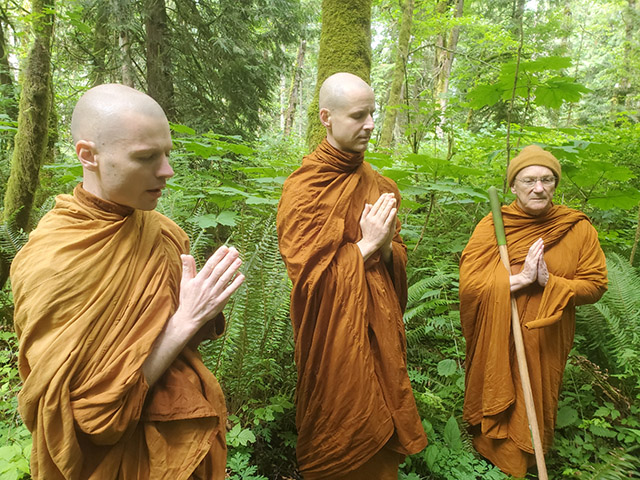
From right, Luang Por Passano (with stick), Ajahn Kovilo, and Ajahn Nisabho, pray during a 2023 monastery land search excursion near Issaquah’s Cougar Mountain.
Photos by: Clear Mountain Monastery, Jesse Molitor, Still One, Steve Wilhelm, Chia-Yung Wu
The Clear Mountain Monastery sangha is now actively searching for a Seattle-area monastery site, two years after monk Ajahn Nisabho returned to the Northwest from Thailand.
Ajahn Nisabho and Ajahn Kovilo, who plans to join the community full-time starting in 2024, are both ordained in the Thai forest tradition, known for its adherence to the Buddha’s ancient monastic code and its focus on meditation and awakening.
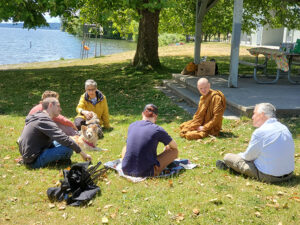
Ajahn Nisabho shares the Dhamma with community members at Clear Mountain’s first public gathering on June 9th, 2021 at Seattle’s Volunteer Park.
“These last two years have made it clear there’s a real hunger for teachings and practice rooted in the suttas and monastic ethos,” said Ajahn Nisabho. “So many intuit the power of the Buddha’s path, and yet struggle to align their lives with it. The refuge of a monastery where all may come and practice is the missing puzzle piece we can provide.”
The Clear Mountain community, which has many members who frequently travel around the U.S. and even the world to visit monasteries, is eager to have a place in close proximity to Seattle, where they may practice and serve the monastic community.
In recent months the Friends of Clear Mountain Monastery board formed a land search committee, with the goal of maintaining the tradition of supporting monks’ dhamma practice in the forest. Leaders hope the monastery will be within a 45-minute drive from Seattle’s Capitol Hill, hopefully closer, to make it accessible to urban people.
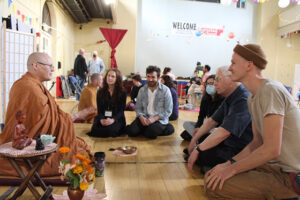
Ajahn Jotipalo speaks with Clear Mountain community members at the Seattle Saturday gathering on May 27th, 2023.
The search team is seeking a site of about 20 acres, to allow scattered huts called kutis, where monastics can live and practice; in addition to a central meditation hall and other facilities. A key requirement will be relatively easy access for the monks to a town center or shopping area, by foot or by public transit, for daily morning alms round.
(This reflects the rules of monks in Theravada tradition, the vinaya, which says that monks can only eat before noon, only food that is offered them, and that food cannot be stored overnight Such rules help prevent monastic communities from cutting themselves off in a spiritual cocoon, but instead developing in a symbiotic relationship with the lay community.
According to Ajahn Nisabho, Clear Mountain’s main concern is to provide a place for resident monastics to live and practice. However, when monastics are not in their annual three-month “rains” retreat, those who live in and around Seattle will be able to visit daily.
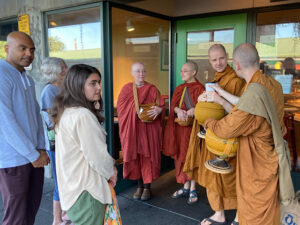
From left, the founding bhikkhunis of Karuna Buddhist Vihara, Ayyā Santussikā and Ayyā Cittānandā, join Ajahn Kovilo and Ajahn Nisabho for morning alms round at Pike Place Market.
Everything, from books to lodgings, teachings to meals, will be offered freely in the spirit of Dhamma. The monastery will be sustained, as monasteries have been since the time of the Buddha, simply by the generosity of those inspired to give.
“I look forward to spending substantial time on retreat in the Seattle area in a forest monastic setting with other lay practitioners and monastics,” said Dave Arterburn, a practitioner who joined the community in late 2022. “I’m particularly inspired by seeing all the young people from the Seattle area who are showing interest in ordaining. It would be such a joy to see them all returning to the Seattle area, to live and practice in our own forest monastery.”
Today it’s clear that interest in a monastery is abundant, with the growth of an inclusive, tight-knit, diverse, and flourishing community. In July 2021 just five people meditated together in with Ajahn Nisabho in Seattle’s Lincoln Park, but now 50 or more gather at Saint Mark’s Cathedral on Capitol Hill, with another 50 joining via Zoom and YouTube.
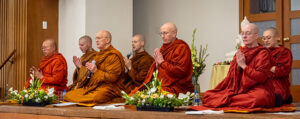
From left, Ajahn Ritti, abbot of Wat Atammayatarama, Ajahn Nisabho, Luang Por Pasanno, founder of Abhayagiri Buddhist monastery, Ajahn Kovilo, Ayyā Anandabodhi, founder of Āloka Vihāra Forest Monastery, as well as Ayyā Santussikā and Ayyā Cittānandā, founders of Karuna Buddhist Vihara, chant together at the Pah Bah.
More than 100 have joined the online Upāsakā group, committing to the five precepts of ethical conduct, daily meditation, and optional weekly Uposatha days of practice, confession, and sutta study.
Additionally, the monks have invited a series of monastics to visit and offer teachings, from Ayyā Anandabodhi in January, 2023, to Luang Por Pasanno this June.
Deep bonds amongst practitioners have begun to ripple across the community, all centered around an interest in the Buddha’s teachings and a yearning to learn from monastics. These are people who have taken on the highest form of renunciation, in order to walk the path of awakening.
During in-person gatherings in Seattle, members often share meals together at Saint Mark’s or in the park on warm and sunny days, discussing what is coming up in their practices and lives.
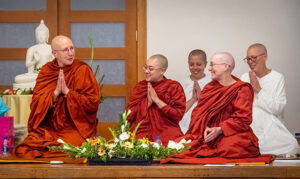
From left, Ayyā Anandabodhi, founder of Āloka Vihāra Forest Monastery, plus Ayyā Cittānandā and Ayyā Santussikā founders of Karuna Buddhist Vihara, and two anigarikas preparing to become nuns, in Seattle at the community’s first robe-offering ceremony.
“It has meant so much to have Clear Mountain Monastery close by, being a Thai Buddhist who grew up in a village in Northeast Thailand (which is the same area that Ajahn Chah, one of the grandfathers of the Thai Forest Tradition, was from),” said Wanida Tucker. She is a community member who drives up to Seattle from Olympia every Saturday, to join the gatherings.
“I have discovered profound connections here,” Tucker said. “This community is the center of my life in the U.S.—from my daily life, family, friends, and teachers. It’s the place that is creating an act of sharing and aspiration. I feel at home when I am with this community, just as I feel at my village in Thailand.”
For another member and volunteer, Bonnie Kosmyna, Clear Mountain is her refuge.
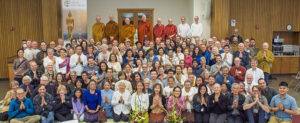
The Clear Mountain community gathers around our honored monastics in Seattle, for the monastery’s inaugural robe offering “Pah Bah” ceremony in June.
“It’s a place where I can unburden, where I can renew and refresh,” said Kosmyna.
In addition to offering in-person and online teachings, Ajahn Nisabho and visiting monastics go on daily alms round at 7 a.m. at Seattle’s Pike Place Market. This traditional activity allows those inspired to offer food, as monastics in the Thai Forest tradition do not accept or handle money.
“This complete surrender to the generosity of others keeps monastics from cutting themselves off in a spiritual cocoon, and allows others to cultivate their spiritual aspirations through generosity,” said Ajahn Nisabho.
Not only are the monastics supported through alms practice, which dates back to the time of the Buddha, but the practice has changed many community members’ lives.
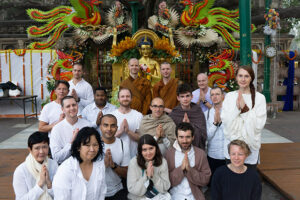
Ajahn Kovilo, Ajahn Nisabho, and the Clear Mountain pilgrims, visiting the Buddhist holy site of Bodh Gaya, India, during the December 2022 pilgrimage.
“Up until a few months ago I never saw myself as a generous person, but giving alms to our monastic community at home, visiting and afar has challenged my perspective. It’s more than just being generous; it’s a profound exchange of energy, kindness, and humility,” said member Alejandro Castillo, who tries to come to alms at least once each week.
“It has allowed me to see the worth of giving, not for recognition or reward, but for the simple joy of contributing to another’s journey,” he said. “I’ve come to realize that charity isn’t just about parting with what I own, but about sharing a piece of my humanity. It’s turned me from a bystander to an active participant in the cycle of kindness and compassion, and subtly, I have unburdened the self from material attachment, enriching the mind with the virtue of generosity. I leave every alms round richer, not poorer, for it.”
To further set the intention for the monastery, Ajahn Nisabho and Ajahn Kovilo led over 30 members on pilgrimage to Thailand and India this past December. In the presence of some of the most renowned Thai Forest Masters and under the leaves of the Bodhi Tree in Bodh Gaya, many pilgrims left feeling a sense of deeper faith in the Dhamma and an even-closer connection to one another and the broader community.
“We wanted to set the monastery’s aspiration at the feet of the masters and roots of the Bodhi Tree,” Ajahn Nisabho said. “To bring a founding group to the tradition’s source seemed essential, in establishing the future monastery on the firm ground of lineage.”
Clear Mountain Monastery is a grand vision, but one the world deeply needs, and supporting conditions have begun to coalesce. Clear Mountain Monastery and its steward organization, Friends of Clear Mountain, received official 501(c)3 status this past year as tax-exempt non-profits, providing the project with an essential legal foundation.
As for myself, I can’t imagine my life without Clear Mountain. It’s been through this community that I’ve created some of the deepest, most supportive relationships of my life. Getting to experience giving alms and witnessing the generosity of others, has become one of the brightest spots in my week.
Through meeting Ajahn Nisabho and Ajahn Kovilo, I’ve had the opportunity to connect with monastics, and to learn more about the renunciate form, their ochre robes an ever-present reminder that life is sacred.
As I reflect back on the last two years, I’m filled with profound gratitude. I dream of the day when we’ll have a physical monastery—a place of refuge in tumultuous times, and an environment most conducive to the path to awakening.
Katie McKenna is a practicing Buddhist in the Theravada Thai forest tradition, and is an active member of the Clear Mountain community in Seattle. When she’s not spending time on retreats and at monasteries around the world, she can be found providing career coaching services to values-driven people, and exploring the forests of the Pacific Northwest.
(Full disclosure: Northwest Dharma News Editor Steve Wilhelm, who participated in building this story, also serves on the board of Friends of Clear Mountain Monastery. Photos were assembled by Clear Mountain sangha member Angela Gizzi.)
